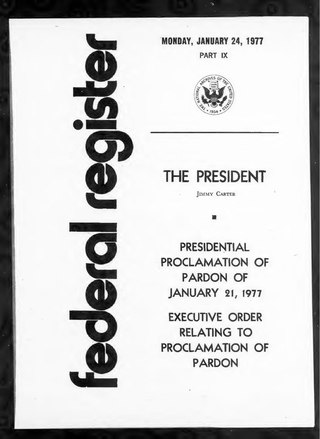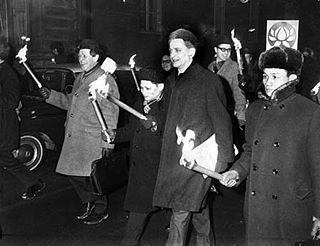
Conscription evasion or draft evasion is any successful attempt to elude a government-imposed obligation to serve in the military forces of one's nation. Sometimes draft evasion involves refusing to comply with the military draft laws of one's nation. Illegal draft evasion is said to have characterized every military conflict of the 20th and 21st centuries, in which at least one party of such conflict has enforced conscription. Such evasion is generally considered to be a criminal offense, and laws against it go back thousands of years.

Desertion is the abandonment of a military duty or post without permission and is done with the intention of not returning. This contrasts with unauthorized absence (UA) or absence without leave, which are temporary forms of absence.
Canada did not officially participate in the Vietnam War. However, it contributed to peacekeeping forces in 1973 to help enforce the Paris Peace Accords.

Jeremy Dean Hinzman is an Iraq War resister who was the first American deserter to seek refugee status in Canada.
The American Deserters Committee (ADC) of Montreal, Quebec, Canada was a group of American Armed Forces members who deserted their posts and went to Canada to avoid the Vietnam War. The deserters were aided in their efforts by groups such as Students for a Democratic Society, the Black Panthers, the Revolutionary Union, The Resistance, American Friends Service Committee, War Resisters League and the Committee for Peace and Freedom.

The War Resisters Support Campaign (WRSC) is a Canadian non-profit community organization, founded in April 2004 in Toronto, Ontario to mobilize support among Canadians and worldwide to convince the Canadian government to offer sanctuary to all U.S. military personnel who wish to come to Canada because of their opposition to the invasion and occupation of Iraq.
Jeffry A. House is a retired lawyer who practiced in Toronto, Ontario, Canada. He is best known for his efforts on behalf and representation of fugitive American soldiers and Indigenous protesters.
The abbreviation or acronym RITA stands for "Resistance Inside the Army", "Resister Inside the Army", or "Resist! Inside the Army".
Joshua "Josh" Key is a United States Army deserter, who fled while on leave from the Iraq War, and is a current resident of Canada. He is the author, with Lawrence Hill, of The Deserter's Tale, a book chronicling his service in Iraq and his subsequent departure from military life.
Robin Long is one of several U.S. Army deserters who sought asylum in Canada because of his opposition to the Iraq War and became the first of those to be deported to the United States after being rejected for refugee status. He was deported from Canada on July 15, 2008.

During the Iraq War, which began with the 2003 invasion of Iraq, there were United States military personnel who refused to participate, or continue to participate, in that specific war. Their refusal meant that they faced the possibility of punishment in the United States according to Article 85 of the US Uniform Code of Military Justice. For that reason some of them chose to go to Canada as a place of refuge. The choice of these US Iraq War resisters to go to Canada has led to considerable debate in Canada's society, press, legal arenas, and political arenas. Much of the debate on this issue has been due to the controversial nature of the Iraq War itself. Among the many elements of that debate are Canada's relationship to the Iraq War, and Canada's relationship to the US, its largest trading partner.

A war resister is a person who resists war. The term can mean several things: resisting participation in all war, or a specific war, either before or after enlisting in, being inducted into, or being conscripted into a military force.

Draft evasion in the Vietnam War was a common practice in the United States and in Australia. Significant draft avoidance was taking place even before the United States became heavily involved in the Vietnam War. The large cohort of Baby Boomers allowed for a steep increase in the number of exemptions and deferments, especially for college and graduate students. More than half of the 27 million men eligible for the draft during the Vietnam War were deferred, exempted or disqualified.

The G.I. movement was the resistance to military involvement in the Vietnam War from active duty soldiers in the United States military. Within the military popular forms of resistance included combat refusals, fragging, and desertion. By the end of the war at least 450 officers were killed in fraggings, or about 250 from 1969–1971, over 300 refused to engage in combat and approximately 50,000 American servicemen deserted. Along with resistance inside the U.S. military, civilians opened up various G.I. coffeehouses near military bases where civilians could meet with soldiers and could discuss and cooperate in the anti-war movement.

Vietnam War resisters in Canada were American draft evaders and military deserters who avoided serving in the Vietnam War by seeking political asylum in Canada between 1965 and 1975. Draft avoiders were typically college-educated and middle class Americans who could no longer avoid conscription. Deserters were usually lower-income and working class who had been inducted into the United States Armed Forces right after high school or had later volunteered.

Terry Marvell Whitmore was an American soldier, deserter and actor.

Proclamation 4483, also known as the Granting Pardon for Violations of the Selective Service Act, was a presidential proclamation issued by Jimmy Carter on January 21, 1977. It granted pardons to those who evaded the draft in the Vietnam War by violating the Military Selective Service Act from August 4, 1964, to March 28, 1973. It was implemented through Executive Order 11967.

The Intrepid Four were a group of United States Navy sailors who grew to oppose what they called "the American aggression in Vietnam" and publicly deserted from the USS Intrepid in October 1967 as it docked in Japan during the Vietnam War. They were among the first American troops whose desertion was publicly announced during the war and the first within the U.S. Navy. The fact that it was a group, and not just an individual, made it more newsworthy.

The Swedish Committee for Vietnam [SKfV – Svenska Kommittén för Vietnam] was a pacifist non-governmental organization founded in Sweden in 1967 that supported North-Vietnam in the Vietnam War. The SKfV was a restructuring of the former Swedish Vietnam Committee [SVK – Svenska Vietnamkommittén]. The committee was aimed at supporting North Vietnam and strongly opposed American involvement in Vietnam with the slogan "Peace in Vietnam" through monetary aid, the torchlight procession, providing asylum for draft evaders, and letters to the Swedish government. Politically left leaning, the SKfV was tied to the Social Democratic Party. The SKfV aimed to increase public focus and involvement in Vietnam. The SKfV pushed the Swedish government to critique the United States over its involvement in what was formerly French Indochina and organized campaigns to raise support for North Vietnam. This campaign exacerbated the worsening Swedish-United States tensions over the American War in Vietnam. In 1974, the SKfV increased its scope to include Cambodia and Laos, marking its second rebranding, prior to the American withdrawal from Vietnam in 1979 and the Vietnamese invasion of Cambodia. The Swedish Committee for Vietnam, Laos, and Cambodia continues to operate today.










